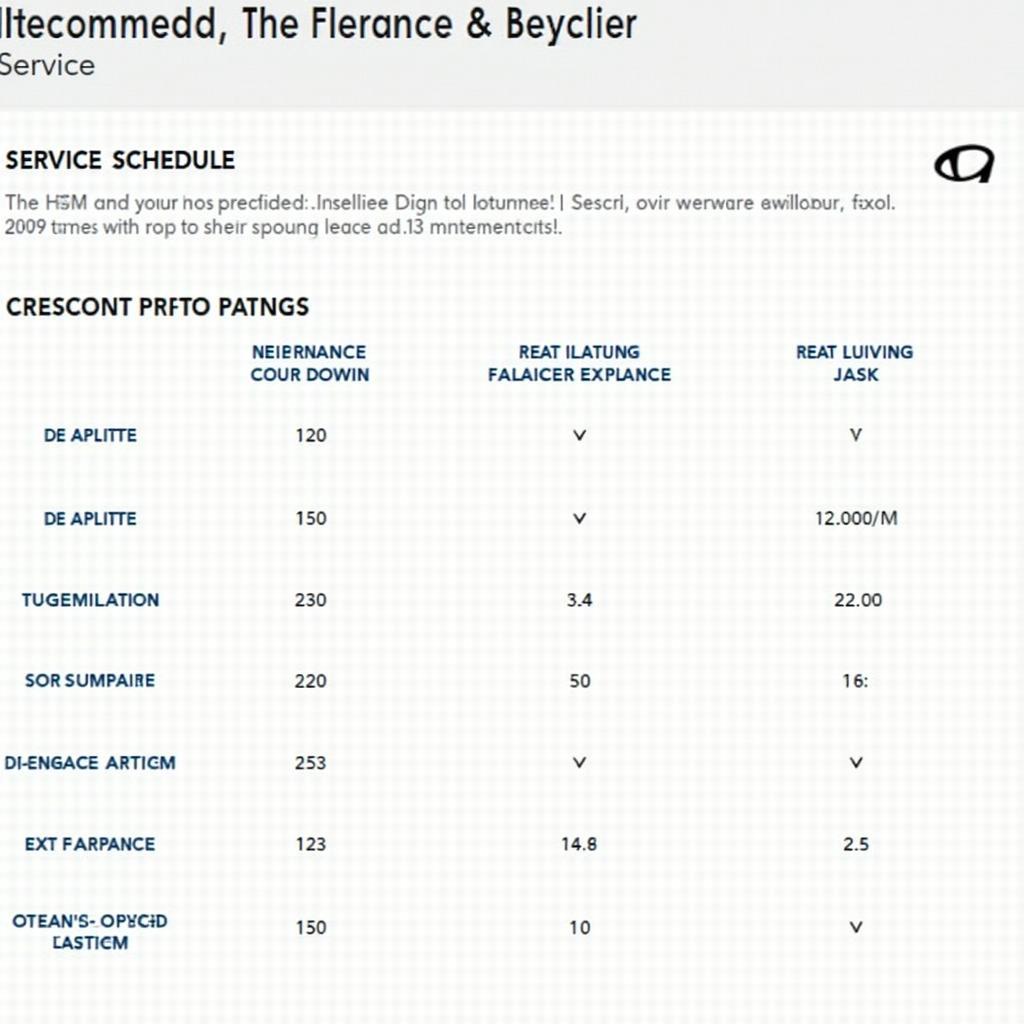Owning a Hyundai means experiencing reliable and stylish transportation. Like any vehicle, regular maintenance is key to ensuring your Hyundai continues to perform at its best. This comprehensive Hyundai Car Service Guide will equip you with the knowledge you need to keep your car in top shape for years to come.
Understanding Your Hyundai Service Schedule
Hyundai provides a detailed service schedule in your owner’s manual. This schedule outlines specific maintenance tasks and their recommended intervals, typically based on mileage or time elapsed.
Key service milestones often include:
- Oil and Filter Change: Essential for engine lubrication and performance, typically every 3,000 miles or 3 months.
- Tire Rotation: Promotes even tire wear and improves handling, typically every 5,000-7,500 miles.
- Brake Inspection: Ensures safe stopping power, usually every 15,000 miles or annually.
- Coolant Flush: Prevents engine overheating and corrosion, typically every 30,000 miles.
- Spark Plug Replacement: Maintains efficient engine combustion, usually every 30,000-60,000 miles depending on the type of spark plugs.
- Air Filter Replacement: Ensures clean airflow to the engine, typically every 15,000-30,000 miles.
Remember, this is a general guideline. Refer to your owner’s manual or consult a qualified Hyundai technician for the most accurate service recommendations for your specific model and year.
Recognizing Common Hyundai Issues
While Hyundais are known for their reliability, it’s wise to be aware of potential issues that might arise.
Here are some common Hyundai problems reported by owners:
- Electrical Problems: Some models have reported issues with electrical components, including faulty wiring, alternator problems, or issues with the infotainment system.
- Transmission Troubles: Certain Hyundai models have experienced transmission problems, often manifesting as slipping gears, rough shifting, or transmission failure.
- Engine Issues: Some Hyundai engines have been known to experience problems like excessive oil consumption, engine knocking, or timing chain issues.
- Suspension Concerns: A few Hyundai models have exhibited suspension-related issues such as premature wear of shocks and struts, leading to a bumpy ride.
Important Note: If you encounter any of these issues or notice unusual noises, smells, or performance changes, it’s crucial to have your vehicle inspected by a qualified Hyundai mechanic immediately.
Finding a Reliable Hyundai Car Service
Choosing the right service provider can significantly impact the longevity and performance of your Hyundai.
Consider these factors when selecting a Hyundai service center:
- Hyundai Expertise: Look for mechanics with specialized knowledge and experience servicing Hyundai vehicles.
- Certifications and Training: ASE-certified technicians or those who have undergone Hyundai-specific training programs demonstrate a commitment to quality service.
- Positive Reviews and Reputation: Check online reviews and ask for recommendations from other Hyundai owners to gauge customer satisfaction.
- Warranty Coverage: Ensure the service center honors Hyundai’s warranty and uses genuine Hyundai parts.
- Transparent Pricing: Request detailed quotes upfront and inquire about any potential additional costs.
[hyundai car service outside in hyd](https://carserviceremote.com/hyundai-car service-outside-in-hyd/)
Essential Hyundai Maintenance Tips
Beyond scheduled maintenance, simple practices can go a long way in preserving your Hyundai’s condition.
- Regular Car Washes: Washing your car regularly protects the paint and prevents dirt and grime buildup.
- Interior Cleaning: Vacuuming the interior and wiping down surfaces keeps your Hyundai’s cabin fresh and inviting.
- Check Fluid Levels Regularly: Periodically check essential fluids like engine oil, coolant, brake fluid, and windshield washer fluid.
- Inspect Tire Pressure: Maintaining proper tire pressure ensures optimal fuel efficiency, handling, and tire lifespan.
- Address Warning Lights Promptly: Never ignore dashboard warning lights; have them diagnosed and addressed promptly.
Pro Tip: Keep a record of all service and repairs performed on your Hyundai. This documentation can be helpful for tracking maintenance history and for potential resale value.
Cost-Effective Hyundai Car Service
Maintaining your Hyundai doesn’t have to break the bank.
Here are some budget-friendly service tips:
- Compare Prices: Get quotes from multiple service centers to compare pricing for specific services.
- Ask About Discounts: Inquire about discounts for AAA members, military personnel, or senior citizens.
- Consider DIY Tasks: Simple tasks like changing the air filter or wiper blades can often be done at home with basic tools.
- Address Issues Early: Don’t delay addressing minor issues as they can escalate into costly repairs if ignored.
Conclusion
By following this Hyundai car service guide, you can ensure your vehicle provides you with miles of enjoyable and dependable driving experiences. Remember, proactive maintenance is always a smarter investment than reactive repairs. Treat your Hyundai right, and it will reward you with exceptional performance and longevity.


